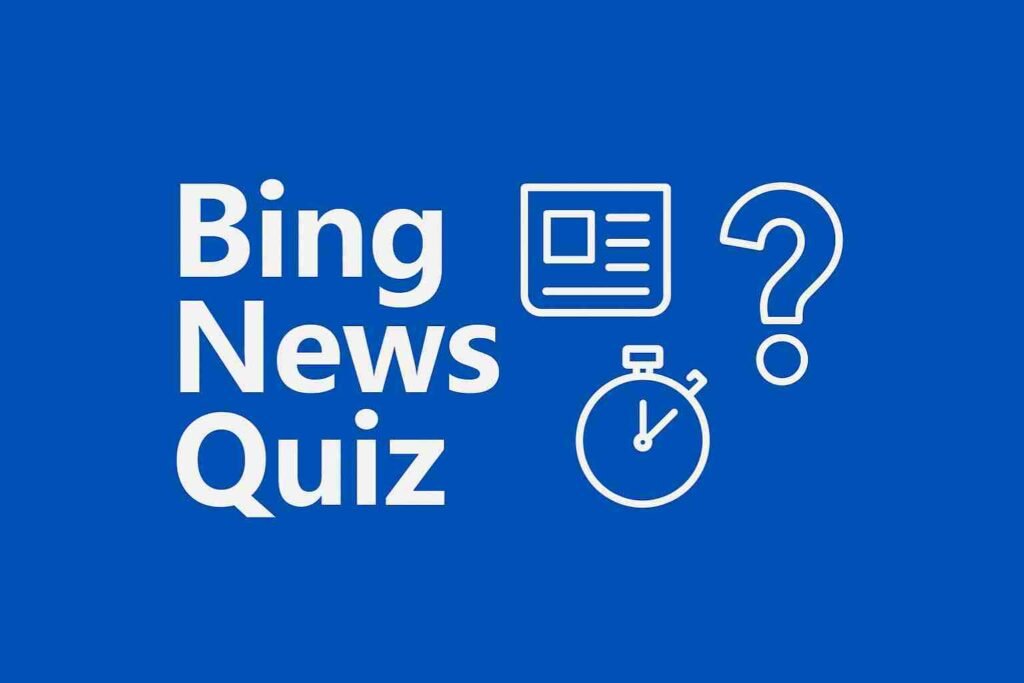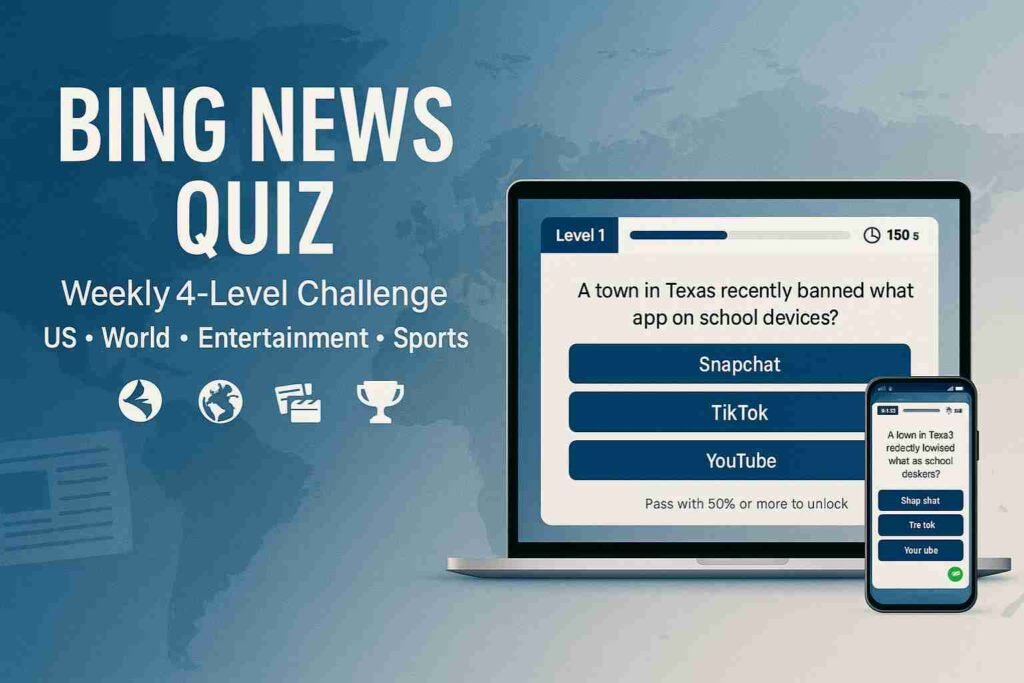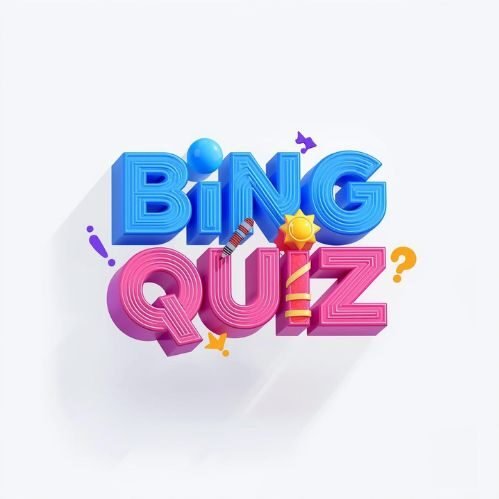Think You’re Up to Date?
Take on the Bing News Quiz — 4 levels, 10 questions each, 100 seconds per round. Can you pass them all and prove your news smarts?
You want a quick way to stay sharp on current events without wading through endless tabs. That’s exactly what the Bing News Quiz delivers—fast, fair, and surprisingly addictive. It’s inspired by the original Microsoft version you’ve probably seen, but built for people who want a little more structure and a real sense of progress.
No fluff here. You’ll get four escalating levels, fifteen questions per level, three choices each, and a ticking clock that keeps things honest. Pass a level and move forward. Miss the mark and try again. Every week, the set refreshes so you’re practicing the art of staying informed—not just memorizing yesterday’s answers.

What the Bing News Quiz Is (and Isn’t)
This Bing News Quiz is a news knowledge workout. It covers:
U.S. current events that actually matter.
World headlines that shape the next quarter, not just the next hour.
Entertainment news (film, streaming, music, celebrity moments) with cultural context.
Sports stories that go beyond final scores—transfers, records, policy changes, and big tournament arcs.
It follows the familiar Microsoft-style three-choice format, but it’s independent and not affiliated with Microsoft. Think of it as the “training mode” for real-world news literacy—tight timing, clean design, and a weekly refresh cycle.
How the Weekly Bing News Quiz Works
Format
Four levels of difficulty, unlocked in order.
10 items per level.
Three choices per question.
100 seconds per level.
50% to pass. Fail? Restart that level as many times as you like.
Progression
You cannot jump ahead. Passing is your passport to the next stage.
The timer keeps you decisive. You’ll learn to trust your recall and skip distractions.
Update cadence
The quiz refreshes weekly with the latest stories. If it dominated the headlines this week, expect to see it here. If it was a flash-in-the-pan rumor, it won’t waste your time.
Fairness
Questions aim for clarity over trickery. We test comprehension, not gotchas.
Why People Keep Coming Back Weekly
You could scroll social feeds and call it “news.” Or you can run your knowledge through a real checkpoint. The Bing News Quiz demands attention, and attention is what turns information into memory.
1. Stronger recall: Headlines stick when you decide between A, B, and C under a clock.
2. Better judgment: Repeated exposure to reliable topics trims the noise from your news diet.
3. Motivation loop: Levels and time pressure make practice feel like play.
4. Broad coverage: U.S., world, entertainment, sports—enough variety to keep you nimble.
5. Weekly rhythm: A small, consistent habit beats a once-a-month binge every time.
The 4-Level Structure (So You Can Game the System—Legally)
Level 1 – Warm Start
Big stories, mainstream angles, names you’ve seen all week. You’re confirming the essentials.
Level 2 – Context Check
Follow-ups, policy implications, schedule shifts, record-breaking stats. Less “headline,” more “meaning.”
Level 3 – Pattern Recognition
You’ll need memory across days: who said what, which city hosted, what changed from last week.
Level 4 – The Pressure Cooker
Edge cases, precise numbers, niche but important updates. The kind of detail that separates “I read about that” from “I can explain that.”
Tip: The clock resets when you restart a level. Use early runs to map the terrain. Pass on the cleanest route.
Editorial Standards
We take accuracy and clarity seriously—because your time matters.
1. Coverage: Stories must be verifiable and current. We avoid speculation and rumor-mill bait.
2. Balance: If a story is developing, we stick to what’s confirmed and note when details are still in motion.
3. Breadth: U.S. policy, geopolitics, science/tech breakthroughs, entertainment releases, award cycles, major sports fixtures and transactions.
4. Quality bar: Questions are plain-language, free of jargon, and tested to remove ambiguous wording.
Behind the scenes: questions are drafted, sanity-checked against multiple reputable outlets, reviewed for clarity, and tagged for level and category. If a story ages out, it leaves the pool. If it matures, we promote it from “flash” to “context” and write smarter questions.
Benefits for Students, Teachers, Families, and Lifelong Learners
Students
Builds fast retrieval before exams or debates.
Encourages reading beyond headlines—who, what, where, why, impact.
Teachers
Ten-minute warm-up at the start of class.
Use missed questions as discussion prompts for media literacy: source quality, bias, framing.
Families
A weekly ritual that’s screen-time you won’t regret.
Younger players learn to tell the difference between viral and important.
Professionals
Quick situational awareness before meetings or interviews.
Sharper instincts for what’s moving markets, voters, or audiences.
Older adults and casual learners
Gentle challenge, friendly pacing, and constant novelty.
Keeps recall, attention, and curiosity in shape.
Summary of Benefits
Knowledge retention under time pressure
Critical thinking about what stories mean
Conversation-ready awareness across topics
Confidence in separating signal from noise
How to Pass More Levels Without Guessing
Read the verbs. “Announced,” “approved,” “signed,” “ruled”—they tell you what actually happened.
Anchor on numbers. Dates, totals, rankings, deadlines: get those right and the question usually falls into place.
Eliminate fast. One option will often be stale or off-topic. Nix it and let the timer work for you.
Think timelines. Many misses come from mixing last week with this week. The quiz won’t.
Play twice. First run for recon, second run for the pass. You’ve got unlimited restarts—use them with intent.
Micro-habit: Do Level 1 every Monday, Levels 2–3 midweek, Level 4 on Friday. You’ll feel the improvement in your recall by week three.
Entertainment and Sports Aren’t “Extra”—They’re Cultural Literacy
Entertainment questions aren’t tabloids in disguise. They track releases, awards, strikes, and trend shifts across streaming, film, music, and gaming—industries that shape behavior at a massive scale.
Sports questions look at more than scores: tournament milestones, records, draft moves, health guidelines, and global events that tie nations together. If it moves fans, the economy, or policy, it’s worth a slot.
Accessibility and Fair Play
Short questions, clean contrast, readable choices.
Timer visible so you can pace yourself.
No endless sign-ups to practice.
Restart-friendly by design—learning is the point.
If you rely on a screen reader or need alternative formats, reach out. Inclusive design isn’t optional here.
Is It Really “Bing News Quiz” If It’s Independent?
The quiz is inspired by the original Bing News Quiz by Microsoft, matching the three-choice mechanics people already know. This version adds a level-based path, a 100-second cap per level, and a weekly refresh tuned for learning. There’s no affiliation, partnership, or endorsement implied—just respect for a solid idea, extended for skill building.
Why This Can Actually Help You Rank in Real Life (Not Just Search)
You’re not trying to “win the internet.” You’re trying to become the person who understands it. This quiz rewards attention, not trivia tricks. Pass a level and you’ll notice you’re reading the news differently tomorrow: scanning for what matters, storing the right pieces, and ignoring panic headlines. That’s the upgrade.
Quick FAQ
1. How hard is it?
Level 1 is friendly. Level 4 will make you sweat in the best way.
2. Can I skip to Level 4?
No. Passing is the gate. It keeps progress meaningful.
3. What counts as a pass?
50% or higher on that level within 150 seconds.
4. How often does it update?
Weekly. If it’s fresh news, it’s fair game.
Final Thoughts
The world moves fast. Your brain can, too. Take the Bing News Quiz once a week and watch your recall, context, and confidence climb. It’s fifteen decisions at a time, under a fair clock. You’ll feel the difference by the next headline.


Althea Grant
Note: This quiz is curated by the Quiz Editorial Team, ensuring accuracy and fun for all trivia fans.
